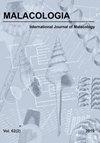Revised Classification, Nomenclator and Typification of Gastropod and Monoplacophoran Families
IF 1
4区 生物学
Q4 ZOOLOGY
引用次数: 423
Abstract
ABSTRACT 2,604 names at the rank of subtribe, tribe, subfamily, family and superfamily have been proposed for Recent and fossil gastropods, and another 35 for monoplacophorans. All names are listed in a nomenclator giving full bibliographical reference, date of publication, typification, and their nomenclatural availability and validity under the International Code of Zoological Nomenclature. Another 790 names, established for categories above the familygroup (infraorder to subclass) are listed separately. A fully ranked, hierarchical classification summarizes recent advances in the phylogeny of the Gastropoda and Monoplacophora. In all, the classification recognizes as valid a total of 721 gastropod families, of which 245 are known exclusively as fossils and 476 occur in the Recent with or without a fossil record; and 20 monoplacophoran families, of which 1 only occurs as Recent. Nomenclatural acts in this work: Amberleya bathonica Cox & Arkell, 1950, fixed as type species of Amberleya J. Morris & Lycett, 1851, under Art. 70.3; Ampezzopleura tenuis Nützel, 1998, fixed as type species of Ampezzopleura Bandel, 1991, under Art. 70.3; Proserpina nitida G. B. Sowerby II, 1839, designated type species of Despoena Newton, 1891; Buccinum glabratum Linnaeus, 1758, designated type species of Dipsaccus H. Adams & A. Adams, 1853; Murex ficus Linnaeus, 1758, designated type species of Ficula Swainson, 1835; Oncomelania hupensis Gredler, 1881, designated type species of Hemibia Heude, 1890; Murex metaxa Delle Chiaje, 1828, fixed as type species of Metaxia Monterosato, 1884 under Art. 70.3; Neridomus anglicus Cox & Arkell, 1950, fixed as type species of Neridomus J. Morris & Lycett, 1851, under Art. 70.3; Navicella clypeolum Récluz, 1843, designated type species of Orthopoma Gray, 1868; Trochus viadrinus M. Schmidt, 1905, fixed as type species of Parataphrus Chavan, 1954 under Art. 70.3; Helix pomatia Linnaeus, 1758, designated type species of Pentataenia A. Schmidt, 1855; Flammulina ponsonbyi Suter, 1897, fixed as type species of Phenacohelix Suter, 1892, under Art. 70.3; Cyrtolites corniculum Eichwald, 1860, fixed as type species of Pollicina Koken, 1895, under Art. 70.3; Purpurina elegantula d'Orbigny, 1850, designated as type species of Purpurina d'Orbigny, 1850, and lectotype of Turbo bellona d'Orbigny, 1850, designated as neotype of Purpurina elegantula; Pyramidella minuscula Monterosato, 1880, fixed as type species of Tiberia Jeffreys, 1884, under Art. 70.3; Cyclostoma delicatum Philippi, 1844, fixed as type species of Trachysma G. O. Sars, 1878, under Art. 70.3; Helix elegans Gmelin, 1791, fixed as type species of Trochoidea T. Brown, 1827, under Art. 70.3; Turritellopsis stimpsoni Dall, 1919, fixed as type species of Turritellopsis G. O. Sars, 1878, under Art. 70.3; Fusus averillii Gabb, 1864, fixed as type species of Volutoderma Gabb, 1876, under Art. 70.3; Voluta pepo Lightfoot, 1786, fixed as type species of Yetus Bowdich, 1822. Curnonidae d'Udekem d'Acoz, nom. nov., and Curnon d'Udekem d'Acoz, nom. nov., are established for Charcotiidae Odhner, 1926, and Charcotia Vayssière, 1906, (between 27 March and 1 May), non Charcotia Chevreux, 1906 (January) [Amphipoda]; Yuopisthonematidae Nützel, nom. nov., and Yuopisthonema Nützel, nom. nov., are established for Opisthonematidae Yu, 1976, and Opisthonema Yu, 1974, non Gill, 1862 [Pisces]. The new family-group name Burnupiidae Albrecht is established in this work; and the names Scolodontina and Orthalicoidei are first used here to denote, respectively, a suborder containing the family Scolodontidae, and an infraorder containing the superfamily Orthalicoidea.腹足纲和单足纲的分类、命名和分型
摘要:已有2604个亚族、部落、亚科、科和超科的名称被提议用于现代腹足类和化石腹足类,另有35个名称被提议为单足纲。根据《国际动物命名规范》,所有名称都列在命名表中,提供完整的参考文献、出版日期、类型及其命名的可用性和有效性。另外790个为家族组(从下到子类)以上的类别建立的名称被单独列出。一个完整的分级分类总结了腹足目和单足目系统发育的最新进展。总的来说,该分类承认共有721个腹足纲有效,其中245个仅被称为化石,476个出现在有或没有化石记录的近期;和20个单鞭毛虫科,其中1个仅以新近的形式出现。本作品中的命名行为:Amberleya bathanica Cox&Arkell,1950年,根据第70.3条,固定为AmberleyaJ.Morris&Lycett的模式种,1851年;Nützel,1998年,根据第70.3条,确定为班德尔Ampezzoplera的模式种,1991年;普罗瑟皮娜·尼蒂达G.B.索尔比二世,1839年,德斯波纳·牛顿的指定模式种,1891年;光滑Buccinum glabratum Linnaeus,1758年,Dipsaccus H.Adams和A.Adams的指定模式种,1853年;林奈(Murex ficus Linnaeus),1758年,指定模式种,1835年;湖北钉螺,1881年,Hembia Heude的指定模式种,1890年;Chiaje的metaxa Murex,1828年,1884年根据第70.3条固定为Metaxia Monterosato的模式种;anglicus Neridomus Cox&Arkell,1950年,根据第70.3条,固定为Neridoms J.Morris和Lycett的模式种,1851年;Récluz Clypiolum Navicella,1843年,灰直骨瘤的指定模式种,1868年;Trochus viadrinus M.Schmidt,1905年,根据第70.3条,1954年被固定为Parataphrus Chavan的模式种;林奈(Helix pomatia Linnaeus),1758年,五带虫A.Schmidt的指定模式种,1855年;金针菇,1897年,根据第70.3条固定为Phenacohelix Suter的模式种,1892年;依第70.3条之规定,1860年固定为Pollicina Koken的模式种的矢车菊;奥氏Purpurina elegantula d’Orbigny,1850,定为奥氏Pur嘌呤a的模式种,奥氏Turbo bellona d‘Orbigni的选型,1850,定名为奥氏purpurpurina elegentula的新型;蒙特罗萨托小金字塔(Pyramidella minuscula Monterosato),1880年,1884年根据第70.3条确定为泰伯里亚-杰弗里斯(Tiberia Jeffreys)的模式种;菲律宾圆口虫,1844年,作为Trachysma G.O.Sars的模式种,1878年,根据第70.3条;Helix elegans Gmelin,1791年,固定为Trochoidea T.Brown的模式种,1827年,根据第70.3条;stimpsoni Dall Turritellopsis,1919年,根据第70.3条,1878年被固定为Sars Turritellopsis的模式种;阿韦利氏镰刀菌(Fusus averillii Gabb),1864年,根据第70.3条,1876年被固定为瓦卢托德玛(Volutoderma Gabb)的模式种;Voluta pepo Lightfoot,1786年,1822年被固定为Yetus Bowdich的模式种。乌代克姆·德阿科斯Curnonidae d‘Udekem d‘Acoz,化名。nov.和Curnon d‘Udekem d‘Acoz,化名。nov.,是为Charcotiidae Odhner,1926年和Charcotia Vayssière,1906年(3月27日至5月1日),非Charcotia Chevreux,1906(1月)[两栖纲]建立的;Yuopisthonematidae Nützel,化名。nov.和Yuopisthonema Nützel,化名。nov.,是为Opisthonematidae Yu,1976和Opisthonema Yu,1974,non-Gill,1862[双鱼]建立的。本工作建立了新的科群名称:黑腹蛛科(Burnupidae Albrecht);Scolodontina和Ortalicoidei这两个名字首先在这里分别用来表示包含Scolodontia科的亚目和包含Ortalicodea超科的下目。
本文章由计算机程序翻译,如有差异,请以英文原文为准。
求助全文
约1分钟内获得全文
求助全文
来源期刊

Malacologia
生物-动物学
CiteScore
2.00
自引率
0.00%
发文量
15
审稿时长
3 months
期刊介绍:
Malacologia publishes papers on all groups of the Mollusca. Malacologia specializes in publishing long papers and monographic treatments. Complete data are especially appreciated. Papers must be of interest to an international readership. Papers in systematics, ecology, population ecology, genetics, molecular genetics, evolution and phylogenetic treatments are especially welcomed. Also welcomed are letters to the editor involving papers published or issues of import to science of the day.
 求助内容:
求助内容: 应助结果提醒方式:
应助结果提醒方式:


